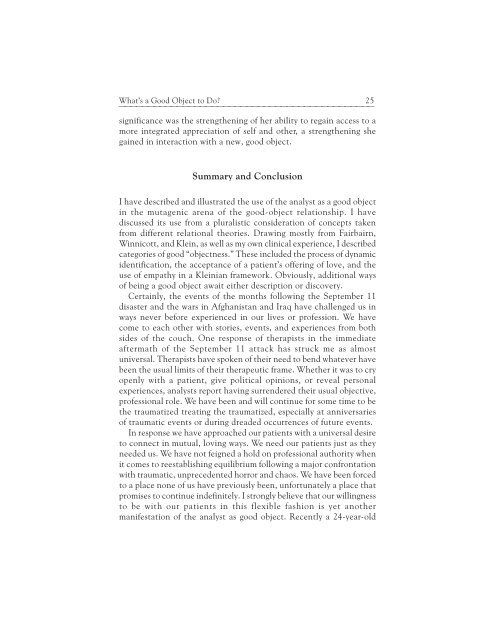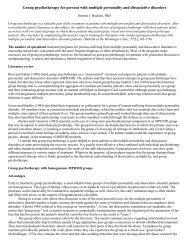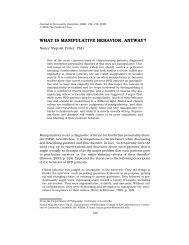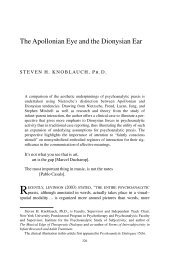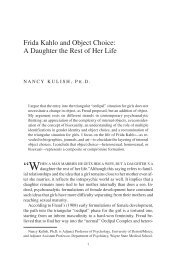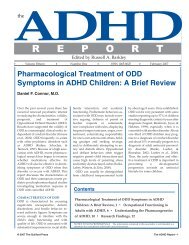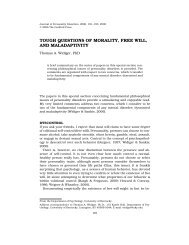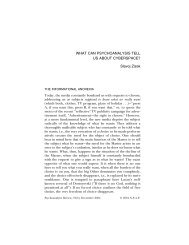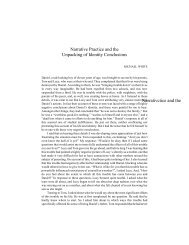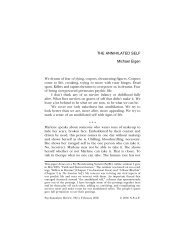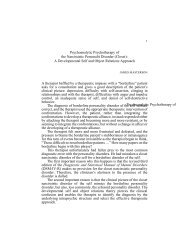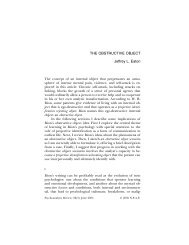What's a Good Object to Do? - PsyBC
What's a Good Object to Do? - PsyBC
What's a Good Object to Do? - PsyBC
Create successful ePaper yourself
Turn your PDF publications into a flip-book with our unique Google optimized e-Paper software.
What’s a <strong>Good</strong> <strong>Object</strong> <strong>to</strong> <strong>Do</strong> 25<br />
⎯⎯⎯⎯⎯⎯⎯⎯⎯⎯⎯⎯⎯⎯⎯⎯⎯⎯⎯⎯⎯⎯⎯⎯⎯⎯⎯⎯⎯⎯⎯⎯⎯⎯⎯⎯⎯⎯⎯⎯⎯⎯⎯⎯<br />
significance was the strengthening of her ability <strong>to</strong> regain access <strong>to</strong> a<br />
more integrated appreciation of self and other, a strengthening she<br />
gained in interaction with a new, good object.<br />
Summary and Conclusion<br />
I have described and illustrated the use of the analyst as a good object<br />
in the mutagenic arena of the good-object relationship. I have<br />
discussed its use from a pluralistic consideration of concepts taken<br />
from different relational theories. Drawing mostly from Fairbairn,<br />
Winnicott, and Klein, as well as my own clinical experience, I described<br />
categories of good “objectness.” These included the process of dynamic<br />
identification, the acceptance of a patient’s offering of love, and the<br />
use of empathy in a Kleinian framework. Obviously, additional ways<br />
of being a good object await either description or discovery.<br />
Certainly, the events of the months following the September 11<br />
disaster and the wars in Afghanistan and Iraq have challenged us in<br />
ways never before experienced in our lives or profession. We have<br />
come <strong>to</strong> each other with s<strong>to</strong>ries, events, and experiences from both<br />
sides of the couch. One response of therapists in the immediate<br />
aftermath of the September 11 attack has struck me as almost<br />
universal. Therapists have spoken of their need <strong>to</strong> bend whatever have<br />
been the usual limits of their therapeutic frame. Whether it was <strong>to</strong> cry<br />
openly with a patient, give political opinions, or reveal personal<br />
experiences, analysts report having surrendered their usual objective,<br />
professional role. We have been and will continue for some time <strong>to</strong> be<br />
the traumatized treating the traumatized, especially at anniversaries<br />
of traumatic events or during dreaded occurrences of future events.<br />
In response we have approached our patients with a universal desire<br />
<strong>to</strong> connect in mutual, loving ways. We need our patients just as they<br />
needed us. We have not feigned a hold on professional authority when<br />
it comes <strong>to</strong> reestablishing equilibrium following a major confrontation<br />
with traumatic, unprecedented horror and chaos. We have been forced<br />
<strong>to</strong> a place none of us have previously been, unfortunately a place that<br />
promises <strong>to</strong> continue indefinitely. I strongly believe that our willingness<br />
<strong>to</strong> be with our patients in this flexible fashion is yet another<br />
manifestation of the analyst as good object. Recently a 24-year-old


